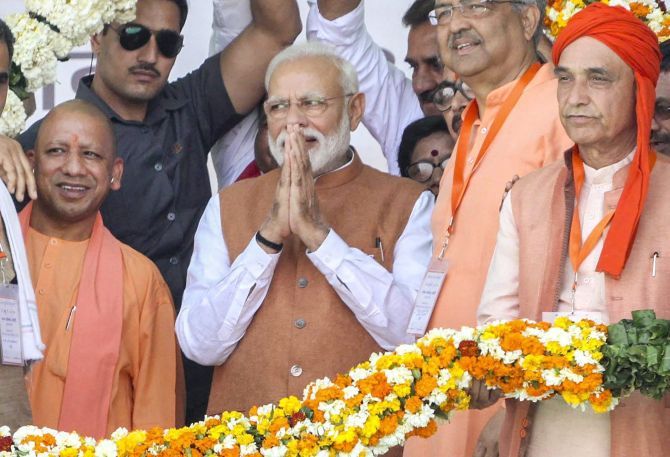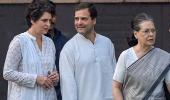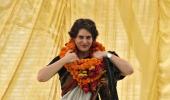'At the end of the day, there will largely be a single candidate against the NDA's.'
'That itself will produce a different result altogether.'

"My back of the envelope calculation tells me that in the Hindi heartland -- which I take to be the states from Jammu and Kashmir to Gujarat not counting Maharashtra -- which has 273 seats and the BJP alone has 223 will see a different outcome because of the alliances we have done," former Maharashtra chief minister and senior Congress leader Prithviraj Chavan tells Aditi Phadnis.
How do you see the national outcome in 2019?
The party learnt its lesson from the 2014 elections, recognising there was too much fragmentation of the vote. The Bharatiya Janata Party came to power on the back of just 31 per cent of the vote. So the remaining 65 per cent or so was against the BJP, but it got scattered.
The lesson for the Opposition was: Don't let the vote get scattered. So Opposition strategy was one candidate against one Hindutva candidate.
Initially, when people talked about a mahagathbandhan, they said it was necessary to project a leader of the alliance. This was ruled out gradually because people were not ready to name a person.
So then the agreement was to have state-wide alliances with the objective of one person against one of the NDA (National Democratic Alliance). An attempt was made, but after its by-election defeats, the BJP also realised that if all Opposition parties came together that would threaten its 31 per cent vote.
So it woke from its slumber and tried to make sure no other alliance partner was allowed to drift away. So the BJP-Shiv Sena tie up was revived.
It also tried to make sure that our alliances don't happen: Quite natural, if I was there, I would have done the same thing.
For instance, Prakash Ambedkar who formed a depressed classes alliance made such impossible demands that they could not be entertained. This alliance keeps mouthing anti-Modi sentiments, but it will help Narendra (Damodardas) Modi by dividing the Opposition votes.
But at the end of the day, there will largely be a single candidate against the NDA's. That itself will produce a different result altogether.
My back of the envelope calculation tells me that in the Hindi heartland -- which I take to be the states from Jammu and Kashmir to Gujarat not counting Maharashtra -- which has 273 seats and the BJP alone has 223 will see a different outcome because of the alliances we have done.
The BJP could lose about 100 seats in these states if you consider the assembly elections result. I don't see any state where the BJP will improve its tally.
But leaders are leaving the Congress and joining the BJP in large numbers. What do they know that you don't?
The Congress has only lost one potential candidate. In Maharashtra, there is a broad alliance with the NCP (Nationalist Congress Party). The Congress would contest 26 seats and the NCP 22.
In Madhya Pradesh, there are similar problems, in Rajasthan there are similar problems...
It is not happening only to our party. It has happened in the NCP also and last time it happened in the BJP also. In the by-election, one candidate left the BJP and joined the BSP...
He didn't join you!
People are leaving parties and joining others. We have had some people leave the BJP and come to us.
Like who?
Local level people... not known faces or Lok Sabha level candidates.
We have ten parties in our alliance in Maharashtra. We are trying to construct a broad coalition against the BJP.
Let's not forget that in the 2014 Lok Sabha elections, we had only 6 seats between the Congress and the NCP. With a by-election victory, it became five. From there it can only go up.
In terms of your relationship with the NCP, why is the NCP even there? Why doesn't it return to the Congress? Are there fundamental programmatic differences?
There are no differences. The party got split because of Sharad Pawar's personal ambitions. And he still believes he can emerge as a consensus candidate of the Opposition parties.
The reason why he left the party was to satisfy his ambition of becoming prime minister. Why he shouldn't merge back into the Congress party is for him to answer.
So if the NCP and the Congress, while being together, can't arrive at a consensus about whom to field and people from the Congress are leaving for the BJP because the NCP cannot be persuaded to give them seats, then isn't that the most telling comment on Opposition unity?
Out of the 48 seats (in Maharashtra), it is one seat. I would say that is an aberration. Yes, the son of the leader of the Opposition has left the party for the BJP. It doesn't augur well for us in that area. But we will fight and we will defeat him.
There is another constituency in Ahmednagar district. We will give them a tough fight.
But it didn't just happen in Maharashtra. It also happened in Goa where Vishwajit Rane, the son of one of your former chief ministers, left the Congress to cross over to the BJP within days of winning as a Congress MLA.
He became a minister. You can't stop people when the BJP is offering inducements.
So now Pratapsingh Rane will not campaign against his son and therefore, will not work against the BJP...
Well, we could have formed the government and prevented (Vishwajit) from leaving. We had more MLAs than the BJP.
We just needed to ensure either Mr (Digamber) Kamat or Mr (Pratapsingh) Rane was made chief minister for a short while -- Mr Rane is 80, but he could have been made CM for two days...
But Mr (Manohar) Parrikar intervened. Mr Rane would have done a better job. Goa has slipped in the last one year and suffered because of Mr Parrikar's illness. But no other leader could have brought the six Independents together.
And in Goa, the NCP was supporting the Parrikar-led BJP while opposing the BJP everywhere else in India.
Well, he is with us now. The NCP is an independent party. It can do what it wants. The NCP fought against us in Gujarat. In Karnataka also it put up candidates against us.
But it is your ally!
(Smiles.) Now, he is with us. I think the NCP wants to ensure its vote share goes up so that it retains its status as a national party
What issues will dominate the election discourse?
There is a grave agrarian crisis that cannot be pushed under the carpet.
The BJP has depressed farm prices so that inflation can be kept under control and urban consumers are kept happy.
The agriculture economy is a mess and we saw the results in the five state elections.
There is a serious jobs crisis. It has not reached the point where people are coming out on the streets, but all the indications are there: Look at engineering college admissions.
No major investment has gone into creating jobs. New technologies are impacting jobs. And there is no strategy in place to counter this.
The huge social tensions are clear and obvious. Demonetisation and GST has hurt the BJP's traditional base.
Daily wage workers have no work. The construction industry is in the doldrums.
The other major issue is the assault on institutions. It does have resonance in the urban areas though it might not ring a bell in the rural areas.
This election will be about institutions of democracy and democracy itself, and how to save it.











